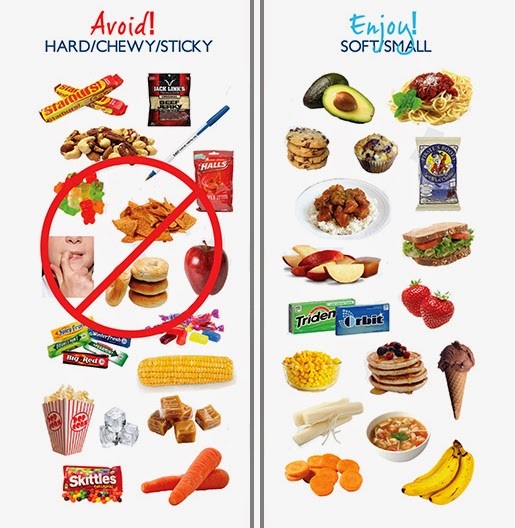Certain dietary habits are known to cause breakage of orthodontic appliances and increase the risk of dental disease. Our aim is to achieve the treatment goals with as few disturbances due to appliance breakage as possible and minimize the side effects of poor diet choices. Remember, teeth move their best in a healthy environment.
Types of Foods Most Likely to Cause Problems
Hard foods can do damage by distorting the wires and breaking the brackets and delicate attachments loose from the teeth. Some examples of these foods are listed below:
- Absolutely avoid chewing ice cubes, bones, popcorn and nuts.
- When eating apples, carrot sticks, celery, etc., cut them into small pieces and chew them with your back teeth.
- Cut pizza into bite-size pieces and eat it with a fork, avoiding hard crusts.
- Hard/crusty breads should be soaked or not eaten at all.
- Hard-shell tacos, Doritos and tortilla chips – avoid them.
Sticky foods cause damage to the appliances by bending the wires and springs and pulling the brackets loose from the teeth. Some examples are:
- Taffy apples
- Caramels
- Chewing gum
- Starbursts
- Tootsie Rolls
Foods high in sugar should be avoided. Please limit the amount of sugary foods you eat. Sugar can increase the plaque that forms on your teeth, causing cavities and permanent white marks. Many foods, like breakfast cereals, have hidden sugars. If you do choose to eat sugary foods, please brush immediately afterward. Avoid between-meal snacking. The worst thing you can do is drink soda or eat crackers and chips between meals without brushing!
You must ABSOLUTELY AVOID habits such as chewing pens, pencils, fingernails, etc. while in braces. Please keep your appliances clean. Immediately following the placement of your braces, you will receive thorough verbal and written instructions on home care, along with helpful hints for smooth sailing during braces. We will provide you with the oral hygiene aids you will need during your time in braces in a special “homecare kit”. We will also give you a prescription for a fluoride gel (Prevident) which should be used when brushing nightly at bedtime. Brush your teeth and braces after eating (including snacks) and before going to bed. When you brush, check to be sure that food particles have not wedged behind the wires or parts of the brackets. Daily flossing is recommended. Poor oral hygiene habits or improper brushing techniques can cause problems for the teeth and surrounding tissue.
Remember to continue to see your family dentist regularly (at least every six months) during orthodontic treatment for cleaning and checkup appointments. Braces do not cause decay and will not be placed over an area in which decay exists; however, decay can occur on unprotected areas if they are not brushed adequately.




